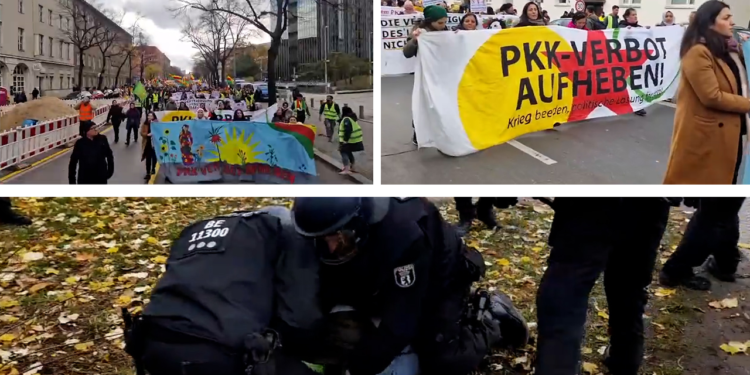Thousands of Kurds and allies from over 40 German cities gathered in Berlin to protest the three-decade-long PKK ban. The rally marked the culmination of a month-long series of actions challenging the prohibition. German police intervention resulted in clashes, with demonstrators attacked and multiple arrests made.

Berlin saw a major protest against the three-decade ban on the activities of the Kurdistan Workers’ Party (PKK) in Germany with participation of thousands of Kurds and their allies from over 40 German cities on Saturday.
The rally, promoted by the ‘PKK-Verbot Aufheben, Demokratie Starken’ (Lift the PKK Ban, Strengthen Democracy) Initiative, is part of a month-long series of actions organised by the campaign in defiance of the long-standing ban.
The German police intervened against participants multiple times, attacking demonstrators and taking several people into custody.
On 22 November 1993, the then-German Minister of the Interior imposed a ban on the PKK’s activities. This was followed by bans on numerous organisations and media that were accused of being part of the PKK structure.
The PKK has been listed as a terrorist organisation by the EU since 2002. Since then, hundreds of Kurdish activists have been charged with violating these bans and with violating sections 129a and 129b of the German Criminal Code, and some have been sentenced to long prison terms.
During the rally, Hüseyin Taşan from the Kurdish Community in Brandenburg called for the lifting of the German state’s ban on PKK activities. He also drew attention to the prolonged solitary confinement of PKK leader Abdullah Öcalan, who has been held in Turkey’s İmralı Island Prison for almost 25 years, with no communication for the past 32 months. Taşan strongly criticised the Turkish government for what he called a “genocidal campaign against the Kurdish people” in various regions of the Kurdish territory.
Further speeches followed, urging an end to the PKK ban and calling the German government out on its financial and military support for Turkey, that enable Turkey’s President Recep Tayyip Erdoğan to continue his attacks on the Kurdish people.








Leave A Comment